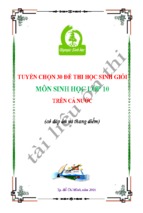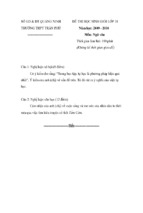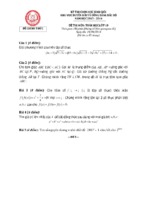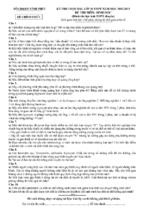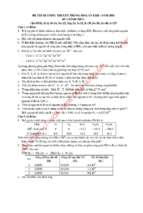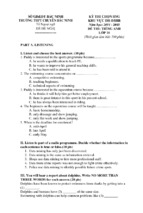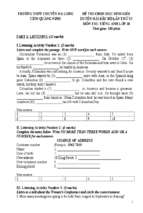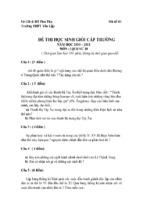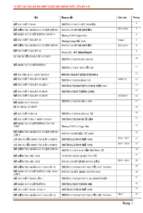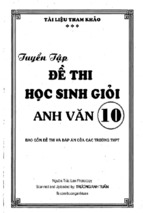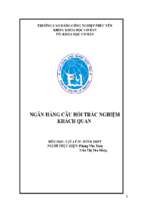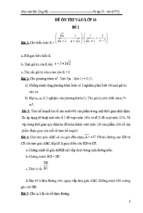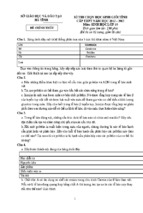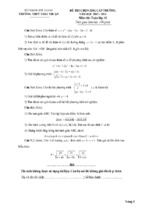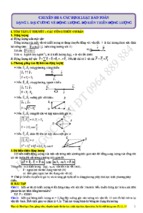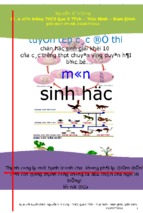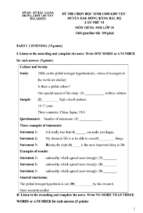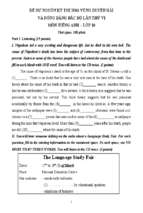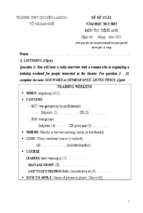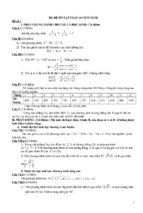SỞ GD&ĐT HÒA BÌNH
ĐỀ THI ĐỀ XUẤT THI HSG NĂM 2013
TRƯỜNG THPT CHUYÊN
MÔN: ANH
HOÀNG VĂN THỤ
LỚP: 10
Thời gian: 180 phút
Đề thi gồm 15 trang. Thí sinh trả lời vào đề thi
PART I. LISTENING
1. Listen to the recording. Fill in each blank a missing word.
Theresa and Charles live in Chicago. They rent a one-bedroom apartment.
Theresa is pregnant. She's (1).......................... a baby in two months, so they're
looking for a larger apartment. Theresa and Charles are talking to the landlord in
a (2)...................... apartment building. He's (3)................... them an apartment
in his building. A family is living there now, but they're going to (4)...... .
next week. The landlord is also saying that there are a few problems in the:
apartment, but he's going to (5)....................them.
Theresa and Charles are looking around the apartment. They can't believe the
(6)...................! In the kitchen, the oven door is open and the oven is (7)…… .
Theresa is trying to open the refrigerator, but she can't. The door is (8)…… .
And the heat isn't working, no hot air is coming up from the radiator.
Charles is in the bathroom. He can't see too well because the light isn't
working. The sink is overflowing. Water is going all over the floor and Charles can't.
turn it off. And water is (9)........................ from the ceiling. There's probably a
problem in the apartment (10)...................... this one.
Theresa and Charles aren't going to rent this apartment. They're leaving in a
hurry!
2. Listen and fill in the travel details of the form below. Fill in each blanks with no
more than 3 words.
VARSITY TRAVEL
Client / Travel data:
Destination: Paris
Number of people travelling: (1)………………………………………
1
Travelling by: (2) ……………………………………………………
Cost of travel: (3)…………………………………………………..
Date of travel: (4)………………………………………….
Client's name: (5)…………………………………………………
Client's address:
10 Old Road Cowley
Telephone number: 997 2041
3. Listen to the recording and choose the correct answer.
1. Why did the girl have to do the shopping?
A. Because she came home late from school.
B. Because her father was going to the bank.
C. Because her mother wasn't feeling well.
D. Because her mother was going to the pictures.
2. What did the girls' father do?
A. He was a shop assistant.
B. He was a German teacher.
C. He was a railway worker.
D. He was a bank clerk.
3. What did the girl get into a panic?
A. She wanted to go to the nearest supermarket.
B. She wanted to go out with her friends.
Cashew wanted to see one of her teachers.
Dasher wanted to meet a friend from London at the station.
4. Why did the girl really want to do?
A.She couldn't find things in the shop.
B.Her mother hadn't written any shopping-list for her.
C.The train from London was late.
D.She dropped all the things she had bought.
5.Why had the girl to go back into the shop?
A.She had dropped her lipstick in the manager's office.
2
B.She had taken something without paying.
C. Her father had robbed the bank.
D. Her mother had rung up to talk to her.
PART II. GRAMMAR AND VOCABULARY
1. Mark the letter A, B, C, or D on your answer sheet to indicate the correct
answer to each of the following questions.
1. The stolen jewels were ___a lot of money.
A. priced
B. worth
C. cost
D. valued
2. My brother is intelligent but he ____common sense .
A. fails
B. lacks
C. misses
D. wants
3. I am ___tired to think about that problem at the moment.
A. simply
B. far too
C. much more
D. nearly
4. His ___ of the school regulations really can’t be ignored any longer.
A. carelessness
B. inattention
C. unfamiliarity
D. disregard
5. ___after trying three times, he passed the examination.
A. Last of all
B. Lastly
C. Last
D. At last
C. peaceful
D. quiet
C. none
D. not
6. I think you should stay___.
A. calm
B. tranquil
7. All work is better than ___at all.
A. no
B. no one
8. The question of late payment of the bills was ___again at the meeting.
A. raised
B. risen
C. brought
D. taken
9. None of us has ever ___of cheating in class .
A. declared
B. persisted
C. approved
D. concluded
10. We have been working hard . Let’s ___ a break .
A. make
11. “ Help!”
A. Just a minute!
B. find
C. do
D. take
C. I come at once !
D. Wait on !
“_____________”
B. Moment !
3
12. “ Would you mind helping me with these heavy boxes?”
A. “Yes, I would. ” B. “ Not at all. ”
_______
C. “ What a pity !”
D.
“my
Gosh!”
13. There should be no discrimination on _______ of sex, race or religion.
A. fields
B. places
C. areas
D. grounds
14. He felt _______ when he failed the exams the second time.
A. discouraged B. annoyed
C. undecided
D. determined
15. He gave me his personal _______ that his draft would be ready by Friday.
A. endurance
B. insurance
C. assurance
D. ensurance
16. Many people like the slow _______ of life in the countryside.
A. step
B. pace
C. speed
17. A number of modern sculptors have rejected _______
D. space
of
minimal
and
environmental art and developed a style of extreme realism.
A. which abstract qualities
B. there are abstract qualities
C. the abstract qualities
D. the qualities are abstract
18. Social scientists believe that _______ from sounds such as grunts and barks
made by early ancestors of human beings..
A. the very slow development of language
B. language developed very slowly
C. language, which was very slow to develop
D. language, very slowly developing
19._________, the first Black denomination in the United States.
A. Richard Allen founded the African Methodist Episcopal Church
B. Richard Allen, who founded the African Methodist Episcopal Church
C. The African Methodist Episcopal Church founded by Richard Allen
D. The foundation of the African Methodist Episcopal Church by Richard
Allen
20. Sarah Frances Whiting opened the _______ of physics in the United States
in 1878.
A. undergraduate teaching was in a second laboratory
4
B. second teaching laboratory of undergraduate
C. undergraduate teaching laboratory was second
D. second undergraduate teaching laboratory
2. There are 10 mistakes in the following passage. Underline the mistakes
and write the correct answers in the space provided.
Let us suppose that you are in the position of a parent. Would you allow your
children read any book they wanted to without first checking their content? Would
you take them to see any film without first finding whether it is suitable for
them? If your answer of these questions is yes, then you are either extremely
permissive, or just plain irresponsible. If your answer is not, then you are
exercising your right as a parent to protect your children from what you consider
to be desirable influences. In other words, by acting as a censor yourself, you are
admitting that there is a strong case for censorship.
Children need protection and it is the parents' responsibility to provide it. But
what about adults? Aren't they old enough to decide that is good for them? The
answer is that many adults are, but don't make the mistake of thinking that
all adults are as yourself. Censorship is for the good of society as a whole.
Highly civilized people might find it possible to live together without laws of
any kind: they would just rely on good sense to solve their problems. But
imagine what chaotic there would be if we live in a society without laws! Like
the law, censorship contributes to the common good.
3. Put one or two suitable prepositions in the blank of each sentence.
1. I came_……………several old friends at the meeting.
2. She got a job so that she could be independent………….her parents.
3. The bridge is………repair, so we'll have to go a different way.
4. The company has laid ………… strict procedures for this kind of situation.
5. I need someone to stand …………me at the ceremony.
6. The books are………..loan to use from a private library.
7. She's not very good at putting her views……….. .
8. The holiday didn't live……….. _our expectations.
5
9. We don't hold………..much hope that the price will fall.
10. When I was a child, it would never have occurred to me not to
comply…………………the rules.
4. Give the correct form of the words in brackets
1. On such a hot day, the sea was……………………(resist)
2. The laws apply to everyone..........………of race, creed or colour(respective)
3. His busy schedule made him completely………...to his students. (access)
4. Barbados was once a British colony, but now it's………….…. (depend).
5. How can you be………to the sufferings of starving people? (difference)
6. I'm afraid I...................and missed my usual bus. (sleep)
7. The Lake District is a very.............…………..area. (romance)
8. The school has won five...............……games. (succession)
9. Don't be so..................…! The bus will be here soon. (patience)
10. He has many year’s experiences of the criminal…………(mental)
5. Fill in each blank a suitable word
Many parents believe that they should begin to teach their children to read
when they are (1) ………more than toddlers. This is fine if the child shows a
real interest but (2)……… a child could be counted—productive if she isn't
ready. Wise parents will have a (3)………. attitude and take the lead from
their child. What they should provide is a selection of (4)………..toys, books
and other activities. Nowadays there is plenty of good (5) ……..available for
young children, and of course, seeing plenty of books in use about the house
will also (6)….. .. them to read.
Of course, books are no longer the only (7)……….
of
stories
and
information. There is also a huge range videos, which can (8)……………
and extend the pleasure a child finds in a books and are (9) …………. valuable
in helping to increase vocabulary and concentration. Television gets a bad
(10) ………….... as far as children are concerned, mainly because too many
children spend too much time watching programmes not intended for their
age group.
6
PART III. READING
1. Read the following passage and choose the best answer to fill in each
blank.
You can make life more difficult for thieves by (1) ________ your wallet
in an inside pocket instead of a back pocket. But make sure that you still have it
if someone bumps into you in a (2) ________ Most pickpockets are very
skillful. Never let your handbag out of your (3) ________. On public transport,
(4)________ hold of it. You are also (5) ________ to take travelers' cheques
rather than cash when you go abroad, and to use cash dispensers which are on
(6) ________ streets, or are well lit at night.
A quarter of all crimes are car thefts or thefts of things from cars, like
radio and cassette players. If your car is (7) ________, you may not get it back.
One in four are never found, and even if it is, it may be badly (8) ________.
Always lock all doors and windows, and think about fitting a car alarm too. If
you are buying a new radio cassette player, it is (9) ________ choosing one that
is security-code or removable by the drive. These precautions will help to (10)
________ thieves.
1. A. taking
B. holding
C. carrying
2. A. mass
B. band
C. crowd
D. group
3. A. view
B. sight
C. visibility
D. vision
4. A. keep
B. catch
C. take
D. have
5. A. suggested
B. told
C. informed
D. advised
6. A. main
B. important
C. principal
D. major
7. A. robbed
8. A. hurt
B. burgled
B. damaged
C. stolen
C. spoilt
D. hijacked
D. injured
9. A. beneficial
B. practical
C. worthwhile
D. sensible
10. A. put off
B. put down
C. put out
D. put back
7
D. bringing
2. Read the following passage and mark the letter A, B, C, or D to indicate
the correct answer to each of the questions
Panel painting, common in thirteenth- and fourteenth-century Europe, involved a
painstaking, laborious process. Wooden planks were joined, covered with
gesso to prepare the surface for painting, and then polished smooth with
special tools. On this perfect surface, the artist would sketch a composition with
chalk, refine it with inks, and then begin the deliberate process of
applying thin layers of egg tempera paint (egg yolk in which pigments are
suspended) with small brushes. The successive
layering of these
meticulously applied paints produced the final, translucent colors.
Backgrounds or gold were made by carefully applying sheets of gold leaf, and
then embellishing of decorating the gold leaf by punching it with a metal rod on
which a pattern had been embossed. Every step in the process was slow and
deliberate. The quick-drying tempera demanded that the artist know exactly
where each stroke be placed before the brush met the panel, and it required
the use of fine brushes. It was, therefore, an ideal technique for
emphasizing the hard linear edges and pure, fine areas of color that were so
much a part of the overall aesthetic of the time. The notion that an artist
could or would dash off an idea in a fit of spontaneous inspiration was
completely alien to these deliberately produced works.
Furthermore, making these paintings was so time-consuming that it demanded
assistance. All such work was done by collective enterprise in the
workshops. The painter or master who is credited with having created the
painting may have designed the work and overseen its production, but it is
highly unlikely that the artist's hand applied every stroke of the brush. More
likely, numerous assistants, who had been trained to imitate the artist's style,
applied the paint. The carpenter's shop probably provided the frame and
perhaps supplied the panel, and yet another shop supplied the gold. Thus, not
only many hands, but also many shops were involved in the final product.
8
In spite of problems with their condition, restoration, and preservation, many
panel paintings have survived, and today many of them are housed in
museum collections.
1. What aspect of panel paintings does the passage mainly discuss?
A. Famous examples.
B. Different styles.
C. Restoration.
D. Production.
2. According to the passage, what was the first step in making a panel
painting?
A. Mixing the paint.
B. Preparing the panel.
C. Buying the gold leaf.
D. Making ink drawings.
3. The word "it" refers to________________
A. chalk
B. composition
C. artist
D. surface
4. The word "deliberate" is closest in meaning to________
A. decisive
B. careful
C. natural
D. unusual
5. Which of the following processes produced the translucent colors found on
panel paintings?
A. Joining wooden planks to form. large sheets.
C. Applying many layers of paint.
B. Polishing the gesso.
D. Covering the background with
gold leaf.
6. What characteristic of tempera paint is mentioned in the passage?
A. It dries quickly.
B. It is difficult to make.
C. It dissolves easily.
D. It has to be applied directly to
wood.
7. The word "demanded" is closest in meaning to _______
A. ordered
B. reported
C. required
D. questioned
8. The "collective enterprise" mentioned in line 18 includes all of the
following EXCEPT_______ .
A. supplying the gold leaf
B. building the panels
C. applying the paint
D. selling then painting
9. The word "imitate" is closest in meaning to _______ .
9
A. copy
B. illustrate
C. promote
D. believe in
10. The author mentions all of the following as problems with the survival of
panel paintings EXCEPT _______ .
A. condition
B. theft
C. preservation
D. restoration
3. Choose the most suitable heading for each section from the list of
headings below. Write the appropriate letter in the space provided after
questions 1-5 in your booklet.
N.B: There are more headings than sections, so you will not use all of
them.
List of Headings
A. Hands off the obesity
B. More active people
C. Reduced consumption
D. Supply and demand of fresh produce
E. Government worry about obesity
F. Class distinctions as to fatty food
Answers:
Section 1…………..Section 2……….. Section 3……………….
Section 4………….. Section 5……………….
Fat of the Land
Section 1
The government worries that it should do something to change the way
people eat. But diets already changing.
Given mankind’s need to fret, it is not surprising that the diseases of
prosperity – stress, depression and, increasingly, obesity – get a lot of play in
10
Britain these days.
On March 3rd, John Reid, the health secretary, announced a three-month
public consultation about the nation's health: in the current mood, that is likely
to focus on obesity. Last week, a report on public health commissioned by the
government cited obesity among its main worries; last month, Tony Blair's
strategy unit floated the idea of a 'fat tax' on foods that fuel obesity; and last
year, the Food Standards Agency, the industry regulator, advocated a ban on
advertising junk food to children.
Section 2
Yet the government swiftly swatted away the idea of a fat tax, and Tessa
Jowell, the culture secretary, has said that she is skeptical about an advertising
ban. Mr. Reid says the government wants to be neither a 'nanny state' nor a
'Pontius Pilate state which washes its hands of its citizens' health'.
Why this ambivalence? Not because of doubts that obesity is a serious
problem. It increases the risk of diabetes, heart disease and cancer. Rather,
because it is not clear that the government can do much about it. There's no
evidence that making fatty foods more expensive would put people off them;
and in Sweden, where advertising to minors is already banned, children are as
porky as they are in any comparable country.
Section 3
What's more, it is not obvious that the problem will worsen. Shoppers'
behaviour suggests the opposite. It is not just the flight from carbohydrates
prompted by the Atkins diet; there is a broader shift going on. Britain, the
world's biggest chocolate-eater, seems to be going off the stuff. In the four years
to 2002, sales of chocolate in Britain fell every year: 2% by volume and 7% by
value over the period. Last month, the new boss of Nestle Rowntree, Chris
White, described it as 'a business in crisis'. (The company says his remarks were
'taken out of context' and denies there is a crisis, but admits that sales of KitKat,
its biggest brand, fell by 2% in 2003.)
11
Companies are edging away from fattening foods. Todd Stitzer, chief
executive of Cadbury Schweppes, Britain's biggest producer of fattening stuff,
says that five years ago, chocolate made up 80% of sales. That's down to a half.
Five years ago 85% of drinks sales were sweet, fizzy stuff. That's down to 56%.
The rest is mostly juice. Diet drinks – which make up a third of the sales of fizzy
drinks – are growing at 5% a year, while sales of the fattening stuff are static.
Section 4
Supermarkets say that people are buying healthier food. According to Lucy
Neville-Rolfe, Tesco's director of corporate affairs, its Healthy Living (lower
calorie) range grew by 12% in 2003, twice the growth in overall sales. Sales of
fruit and vegetables are growing faster than overall sales, too. That may be partly
because fresh produce y is getting more various, more is available all year round
and better supply boosts demand. Five years ago Tesco stocked six or seven varieties
of tomato. Now it stocks 15.
The spread of big supermarkets, which offer better produce than the mouldy
stuff at the corner shop, may improve diets. A study carried out by the University
of Southampton on a big new supermarket in a poor part of Leeds concluded that
after it opened, two thirds of those with the worst diets ate more fruit and
vegetables.
Cafes and restaurants report an increase in healthy eating, too. Pret A Manger, a
sandwich chain, says that sales of salads grew by 63% last year, compared with
6% overall sales growth. McDonald's, which introduced fruit salad a year ago, has
sold 10m portions since.
Section 5
But it isn't just eating too much fatty stuff that makes people fat. It's indolence,
too. That may be changing. Gym membership figures suggest that more Britons at
least intend to get off their sofas. According to Mintel, a market research company,
there were 3.8m members of private gyms last year, up from 2.2m in 1998.
So why isn't all this virtue showing up in the figures? Maybe it is starting to.
12
The average man got thinner in 2002, the most recent available year, for the first
time since body-mass-index records began; women's BMI was static. One year, of
course, does not make a trend, but a fall in Americans' weight last year, also for the
first time, supports the idea that something is changing in the rich world’s fattest
countries.
4. Read the following text and choose from the list A - F the best phrase to
fill each of the blanks. Write your answers in the spaces below. There is one
extra phrase.
Card game rules
Card playing has brought pleasure to millions of people for some six
centuries and is popular the world over, so it is not surprising to discover that
thousands of game have been invented. There is a widespread belief that all card
games have official rules but the situation is complex and this idea is best
ignored. Widely played games (1) ……..in much the same way. National and
regional games may have official rules published by an organization devoted to
the game, but these (2)………….in local and family play. Of course, it is
essential to establish a set of rules for club or tournament play, but these
(3) ……….as the rules of the club, not the rules of the game. In homes people
play cards for enjoyment and will naturally introduce and drop rules to suit their
tastes. It is because tastes (4)…….. and generation to generation that card games
evolve. Games that no longer evolve become extinct.
No book can do more than (5) ………., or are said by other books to be
played. Nor should it expect to. The only important thing is that everybody
playing around the same table at the same time should be following the same
rules.
A. should be regarded
B.have decided between alternative rules
C. tend to be played everywhere
D. vary from place to place
E. describe how games are played
13
F. are happily ignored
PART IV. WRITING
1. Rewrite the following sentences, keeping their meaning unchanged,
beginning with the words given.
1. Alternative medicine is a complete mystery to some people.
Some people are.........................................................................…
2. You may be disqualified if you don't obey the regulations.
Failure..............................................…………………………………
3. Her remarks on the teacher’s bad behavior were ignored.
Nobody…………………………………………………………………
4.I only recognized him when he came into the light.
It was not until................................................................................
5. They declared war on the pretext of defending their territorial rights.
The excuse......................................................................................
2. Use the word(s) given in brackets and make any necessary additions to
write a new sentence in such a way that it is as similar as possible in meaning
to the original sentence. Do NOT change the form of the given word(s).
1. We couldn't hear most of what he said. (inaudible)
……………………………………………………………………………….
2. Their exclusion from union meetings stems from their shocking behaviour
at the last one. (since)
……………………………………………………………………………
3. Generally, the majority of the audience is made up of school children.
(comprise)
……………………………………………………………………………
4. I though he might have forgotten our appointment so I faxed him. (case)
…………………………………………………………………………..
14
5. The final scene was so horrible that I had to turn away. (bear)
………………………………………………………………………………
3. Write a paragraph of about 200 words to answer the questions
Should secondary students take part in extracurricular activities?
………………………………………………………………………………………………
………………………………………………………………………………………………
………………………………………………………………………………………………
………………………………………………………………………………………………
………………………………………………………………………………………………
………………………………………………………………………………………………
………………………………………………………………………………………………
………………………………………………………………………………………………
………………………………………………………………………………………………
………………………………………………………………………………………………
………………………………………………………………………………………………
………………………………………………………………………………………………
………………………………………………………………………………………………
………………………………………………………………………………………………
………………………………………………………………………………………………
………………………………………………………………………………………………
………………………………………………………………………………………………
………………………………………………………………………………………………
………………………………………………………………………………………………
………………………………………………………………………………………………
THE END
SỞ GD&ĐT HÒA BÌNH
ĐỀ THI ĐỀ XUẤT NĂM 2013
TRƯỜNG THPT CHUYÊN
MÔN: ANH
15
HOÀNG VĂN THỤ
LOP: 10
ĐÁP ÁN
PART I. LISTENING
1. Fill in each blank a missing word.
1. expecting
2. large
3. showing 4. move
6. mess
7. smoking 8. stuck
9. leaking
5. fix
10. above
2. Fill in each blanks with no more than 3 words.
1. 2
2. Air France
4. 15th August
3. 65 pound
5 Ms Rose Barnes
3. Listen to the recording and choose the correct answer.
1C
2D
3B
4B
5A
PART II. GRAMMAR AND VOCABULARY
1. Choose A, B, C, or D
1B
2B
3B
4D
5D
6A
7C
8A
9C
10D
11A 12B 13D 14A 15C 16B 17C 18B 19A 20D
2. Mistake correcting
1. read to read
2. their its
3. finding finding out
4. answer of answer to
5. not no
6. desirable undesirable
7. that is good what is good
8. as yourself like yourself
9. chaotic chaos
10. live lived
3. Prepositions
1. across
2. of
3. under
4. down
7. across
8. up to
9. out
10. with
5. in for
6. on
4.Form of the words
1. irresistible
2. irrespective
3. inaccessible
4. independent
5. indifferent
6. overslept
7. romantic
8. successive
9. impatient
10. mentality
5. Fill in each blank a suitable word
16
1. scarcely
2. forcing
3. contented
4. stimulating
5. material
6. encourage
7. source
8. reinforce
9. equally
9. criticism
PART III. READING
1. Four- option multiple choice cloze
1C 2C 3A 4C 5D
2. Choose A, B, C or D
6A
7C
8B
9C
10B
1D
5C
6A
7C
8D
9A
10B
4D
5B
2B
3B
4B
3. Heading matching
1E
2A
3C
4. Phrase filling
1C
2F
3B
4D
5E
PART IV. WRITING
1. Completing sentences
1. Some people are mystified by alternative medicine.
2. Failure to obey the regulations may lead to/result in disqualification.
3. Nobody took notice of / paid attention to her behavior.
4.It was not until he came into the light when I recognized him.
5. The excuse for the pretext was defending territorial rights / the defence of
territorial rights.
2. Rewriting the sentences
1. Most of what he said was inaudible.
2. They have been excluded from union meetings since their shocking
behavior at the last one / Since their shocking behaviour at the last one, they
have been excluded from union meetings.
3. Generally, school children comprise the majority of the audience.
4. I faxed him in case he had forgotten our appointment.
17
5. I couldn’t bear to watch the final scene and (I) had to turn away/ The final
scene was to much to bear so I had to turn away.
THE END
Dowload full:
https://drive.google.com/drive/folders/1INZ2NEy16t87rFApnzuJdXv9ErptzZF?usp=sharing
18
- Xem thêm -

